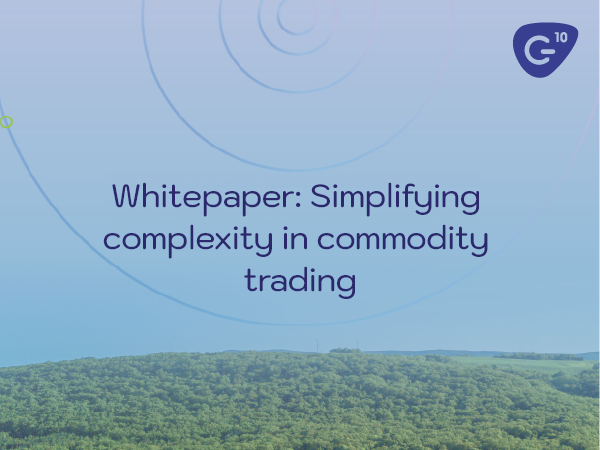Energy Trading Week is again just around the corner, taking place in London from 28-29 September. The last several iterations of this conference have highlighted the industry’s growing focus on environmental markets, and the topic is given even more prominence this year, with the Environmental Markets Week conference taking place alongside Energy Trading Week.
Gen10 fully support our commodities clients in their energy transition, so we are sponsoring these events as Carbon Markets Partner. We will be discussing how Commodity Management technology can support decarbonisation on our stand. And Richard Williamson, Gen10 Founder & CEO, will be speaking as part of the panel session – Carbon Accounting: top challenges and how to overcome them.
Ahead of the event, we are exploring some of the carbon-related challenges energy and commodity traders are already facing, as well as future challenges, to help you prepare to get the most out of the discussions on the day.
Carbon challenges are ever-growing
Carbon compliance
The most critical carbon challenges for all in energy and commodities are those that are associated with regulatory risk. Legislation on organisations’ carbon and environmental impacts varies by geography and is constantly changing. Adding to the geographical complexity is the fact that carbon policies can even affect commodities entering a given jurisdiction, not necessarily just those sourced within it.
For example, the European Union is supporting its internal Emissions Trading Scheme with a Carbon Border Adjustment Mechanism (CBAM). This is a tariff that will be applied to certain carbon-intensive products entering the EU from October 2023. The EU has also adopted the EU Deforestation-free Regulation that applies to a broad range of soft commodities entering the bloc, regardless of where the trading company is based.
Voluntary carbon markets
Many commodities organisations are seeking to lessen their environmental impact above and beyond the minimum legislative requirements. There are many approaches organisations can take, but these often involve the use of carbon credits purchased on voluntary carbon markets.
However, voluntary carbon markets have their own challenges. The credibility of voluntary carbon credits has featured in several sceptical news stories recently, as voluntary credits approved by the world’s leading certifier have been found to not reduce or capture carbon dioxide in line with their claims. This is particularly the case when newer methodologies are applied to older credits.
Credibility issues can affect credit pricing but, more seriously, can lead to stranded assets if previously-accepted projects are found to have little environmental impact. Some consider this a feature of the evolving market, and a reflection of how credits and verification systems are improving over time. But organisations that are looking to offset their carbon emissions, or generate a profit from brokering carbon credit agreements, need some certainty that the credits will remain credible and valid.
Standardisation is another challenge to overcome. Some see this as an issue in carbon credits, but in voluntary markets, different quality metrics can be used to differentiate credits and inform pricing. But a lack of standardisation in measuring carbon emissions is a separate challenge. Estimates and carbon calculators are often used to approximate an organisation’s real-world carbon footprint, but it can be difficult to know whether the business is calculating these estimates according to the industry standard, particularly as mandatory carbon reporting can vary greatly by jurisdiction. Although, there are multiple international standards and reporting frameworks, these do actually align with the overarching GHG Protocol, so standardisation is actually probably much closer than many assume.
Where estimates are standardised, they can also cause problems for the best-performing organisations, as generic estimates penalise the most environmentally-friendly actions and reward the worst performers by estimating their emissions at the same level. To take shipping as an example, reducing speed by 20% can drop fuel consumption by 40%, and combining these operational efficiencies with technical improvements means that industry-leading ships can be twice as efficient as industry laggards. This should therefore be reflected in the estimates.
Solving the carbon challenge with Commodity Management technology
A good Commodity Management System like Gen10’s CommOS can go a long way towards solving some of these carbon accounting challenges. Beginning with the inaccurate estimates, CommOS is a truly collaborative platform that allows you to integrate with many different data providers. So, for example, you can integrate with vessel identification and vessel tracking software to gain an accurate picture of the vessel type, distance, speed, and emissions of a shipment, providing a much more accurate picture than a generic estimate. This allows you to reap the rewards of choosing more efficient shipping as it is reflected in the carbon emissions calculation.
These integrations also help overcome the standardisation challenge by allowing you to incorporate and adapt to the best carbon calculators, and you have the flexibility to change your systems and integrations as things change down the line. You can therefore choose the best of breed for any platform you want to integrate, with the flexibility to upgrade when needed, rather than being locked into one provider.
And with customisable quality data and built-in traceability, you can manage carbon emissions across your operations, linking purchase and sale contracts with ease, and managing certifications by counterparty, contract, or shipment. The automatic digital audit trail provides assurance and means you can pass accurate, relevant data on to the rest of your value chain.
Technology is only part of the solution
Commodity Management technology can help address many of the carbon challenges. It can help you analyse and share data to make the best and most accurate assessments of your carbon emissions, as well as generate the best results from your low-carbon efforts. However, if the data does not exist in the first place, or industry partners do not value it in the same way, there is only so much that technology can add.
Collaboration through Commodity Management Systems is a vital piece of the puzzle, but so is industry collaboration and gaining agreement on how we value carbon-reducing activity. Join us at Energy Trading Week to be part of this conversation.
Want to read more?
Subscribe now for monthly updates
By submitting your details you agree that we can store your data and communicate with you. You can opt out of these communications at any time. Read all in our Privacy Policy.



